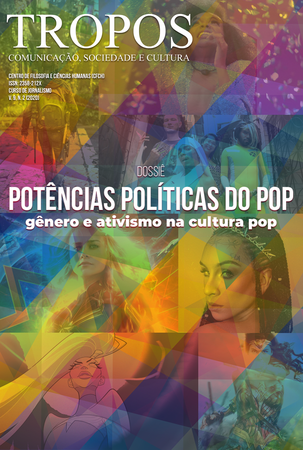Keywords:
Pop music, Emotional communities, Song, Latin American identity, History of present timeAbstract
This paper aims to discuss the relationship between pop music and emotional appeal and affections, trying to understand especially its role in the constitution of emotional communities. Based on the expansion of reggaeton in the mainstream over the last few years, and discussions regarding the withdrawal of the rights of Latin American migrants in the United States during the Donald Trump administration, the intention is to analyze the role played by the song Havana (ft. Young Thug ), by Cuban singer Camila Cabello, as a way of expressing and reaffirming Latin identity. With a romantic theme, the song narrates the heterosexual romantic involvement between two young people, one of the characters being Cuban and the other American, with the background of the relationship between the island and the USA, as well as the migrant identity. Understanding the identities as constituted from identifications and representations expressed, for example, through cultural products, it is intended to observe the uses of the song by / for the migrant community affected by the new American policies. We understand Havana not only as a product, but also as a process, analyzed through performances and listening and sharing spaces such as digital, directly related to emotional communities in the United States to understand the possible social and political impacts of pop music. , especially when associated with contemporary Latin rhythms.
Downloads
References
CANCLINI, N. G. Latino-americanos à procura de um lugar neste século. São Paulo: Iluminuras, 2008.
CARNEIRO, D. F.. Os usos da biografia pela micro-história italiana: Interdependência, biografias coletivas e network analysis. In: AVELAR, A. de S.; SCHMIDT, B. B. (Orgs.). O que pode a biografia. São Paulo: SP, 2018.
CHARTIER, R. O mundo como representação. Estudos Avançados. Vol. 5, n.11. São Paulo. Jan/Abr. 1991.
__________. A História ou a Leitura do Tempo. Belo Horizonte: Autêntica, 2009.
CHOMSKY, A. História da Revolução Cubana. São Paulo: Veneta, 2015.
GONZÁLEZ, J. P. Pensando a música a partir da América Latina: problemas e questões. São Paulo: Letra e Voz, 2016.
GUMBRECHT, H. U. Produção de presença: o que o sentido não consegue transmitir. Rio de Janeiro: Contraponto, 2010.
HALL, S. A identidade cultural na pós-modernidade. 11. ed. Rio de Janeiro: DP&A, 2006.
____. Pensando a diáspora: reflexões sobre a terra no exterior. Belo Horizonte: Editora UFMG, 2003.
____. Quem precisa da identidade? In: SILVA, T. T. (Org.); HALL, S.; WOODWARD, K. Identidade e diferença. A perspectiva dos estudos culturais. Petrópolis: Editora Vozes, 2000.
KOSELLECK, R. Estratos do tempo: estudos sobre a História. Rio de Janeiro: Contraponto, Ed. PUC-RJ, 2014.
___________. Futuro passado: contribuição à semântica dos tempos históricos. Rio de Janeiro: Ed. PUC-Rio, Contraponto 2006.
LEVI, G. A herança imaterial. Rio de Janeiro: Civilização Brasileira, 2000.
LÓPEZ CANO, R. Juicios de valor y trabajo estético en el estudio de las músicas populares urbanas de América Latina. In: SANZ, J. F.; LÓPEZ CANO, R. Música popular y juicios de valor: una reflexión desde América Latina. Caracas: Fundación Cearg, 2011.
MOREIRA, I. L. Uma estrela em ascensão: O Portal Popline e a rápida ascensão na carreira multimídia da cantora Camila Cabello. Revista Transversos, v. 11, p. 81-97, 2017.
NAPOLITANO, M. História & música: história cultural da música popular. 5. ed. Belo Horizonte: Autêntica, 2005.
____________. A relação entre arte e política: uma introdução teórico-metodológica. Temáticas (UNICAMP), v. 37-38, p. 25-56, 2011.
PEREIRA, S. L. Matrizes e mediações das canções românticas na América Latina. In: ULHOA, M.; PEREIRA, S. L. (Org.). Canção romântica: Intimidade, mediação e identidade na América Latina. 1. ed. Rio de Janeiro: Folio Digital/Letra e Imagem, 2016, p,25-46.
REYNOLDS, S. Retromania: Pop Culture's Addiction to Its Own Past. Nova Iorque: Macmillan, 2011.
ROJAS, Y. P. Lenguajes del poder. la música reggaetón y su in uencia en el estilo de vida de los estudiantes. Plumilla Educativa. n. 10, 2012, págs. 290-305.
ROUSSO, H. A Última catástrofe: a história, o presente, o contemporâneo. Rio de Janeiro: Fundação Getulio Vargas, 2016.
SANTOS, M. O poder norte-americano e a América Latina no pós-Guerra Fria. São Paulo: Annablume; FAPESP, 2007, p. 145-174.
SARDO, S. Guerras de Jasmim e Mogarim: Música, Identidade e Emoções em Goa. Alfragide: Texto Editores LDA, 2010.
SOARES, T. Percursos para estudos sobre música pop. In: SÁ, S. P. de; CARREIRO, R.; FERRARAZ, R. (Orgs.) Cultura Pop. Salvador: EDUFBA ; Brasilia : Compós, 2015.
SCOTT, J. W. Experiência. In: Falas de Gênero. Florianópolis: Editora Mulheres, 1999. P 21-55
VIEIRA, R. A. Os cubanos querem deixar cuba? In: SANTOS, F. L. B. dos; VASCONSELOS, J. S.; DESSOTTI, F. R. (Org.). Cuba no século XXI: Dilemas da revolução. São Paulo: Elefante, 2017.
VICENTE, E. Da vitrola ao iPod: uma história da indústria fonográfica no Brasil. São Paulo: Alameda, 2014.
WOLFF, M. Fogo e Fúria: Por Dentro da Casa Branca De Trump. Rio de Janeiro: Objetiva, 2018.
Downloads
Published
How to Cite
Issue
Section
License
Transferência de direitos autorais:
Declaro que após aprovado para publicação a Revista Tropos editada pela Universidade Federal do Acre (UFAC), passará a ter os direitos autorais do trabalho, que se tornarão propriedade exclusiva da Revista, sendo permitida a reprodução total ou parcial desde que devidamente referenciada.

